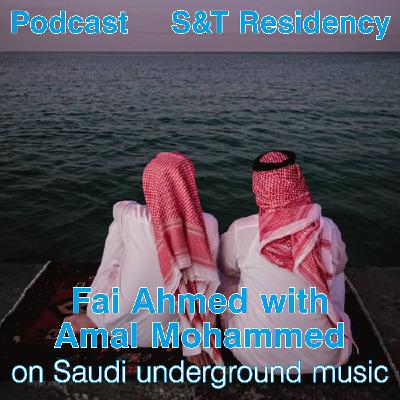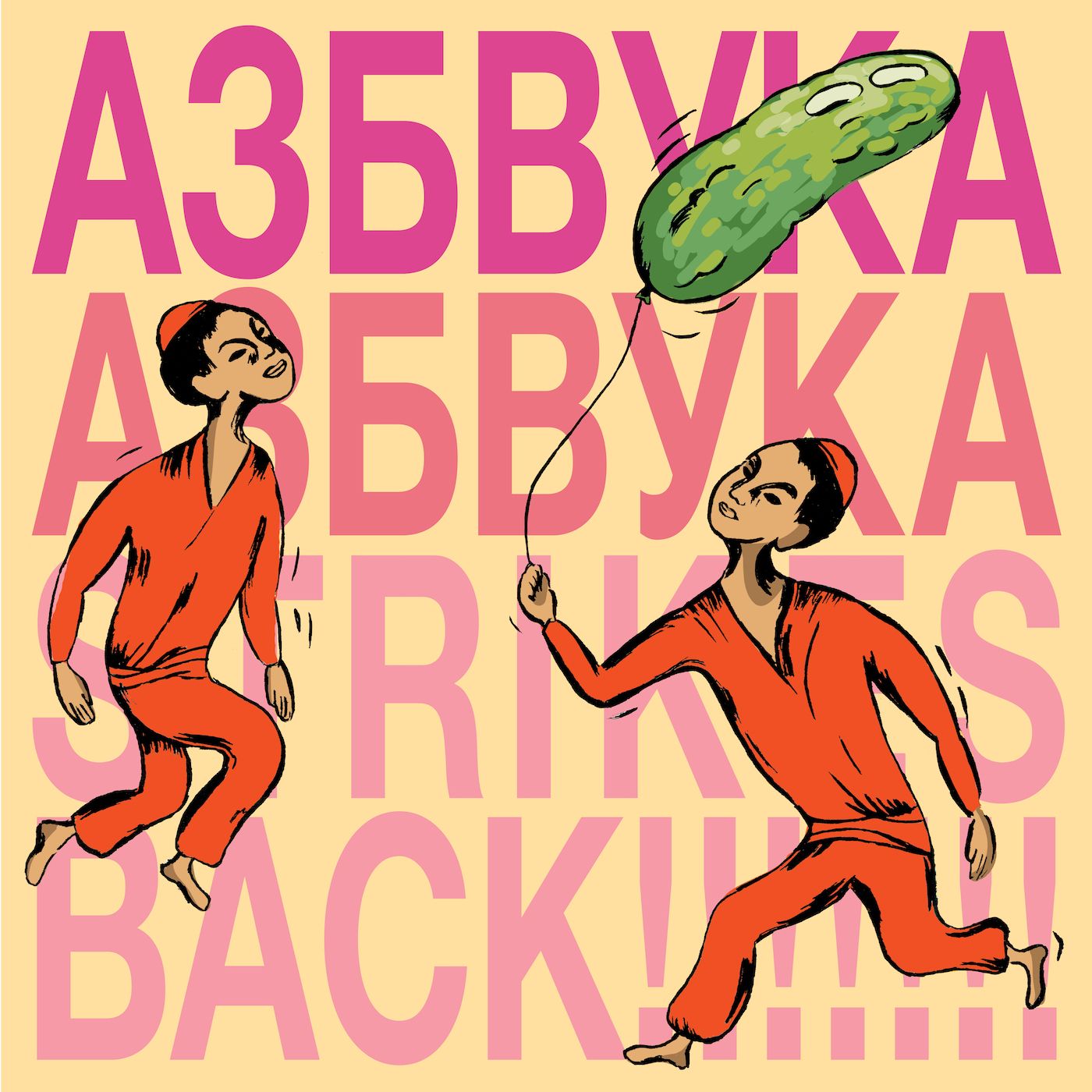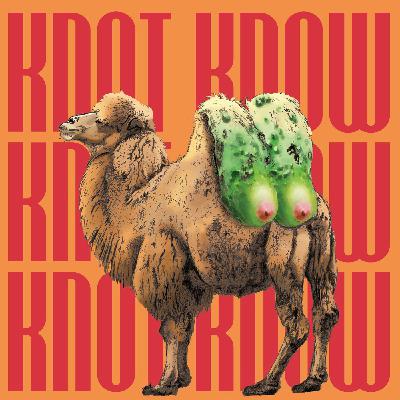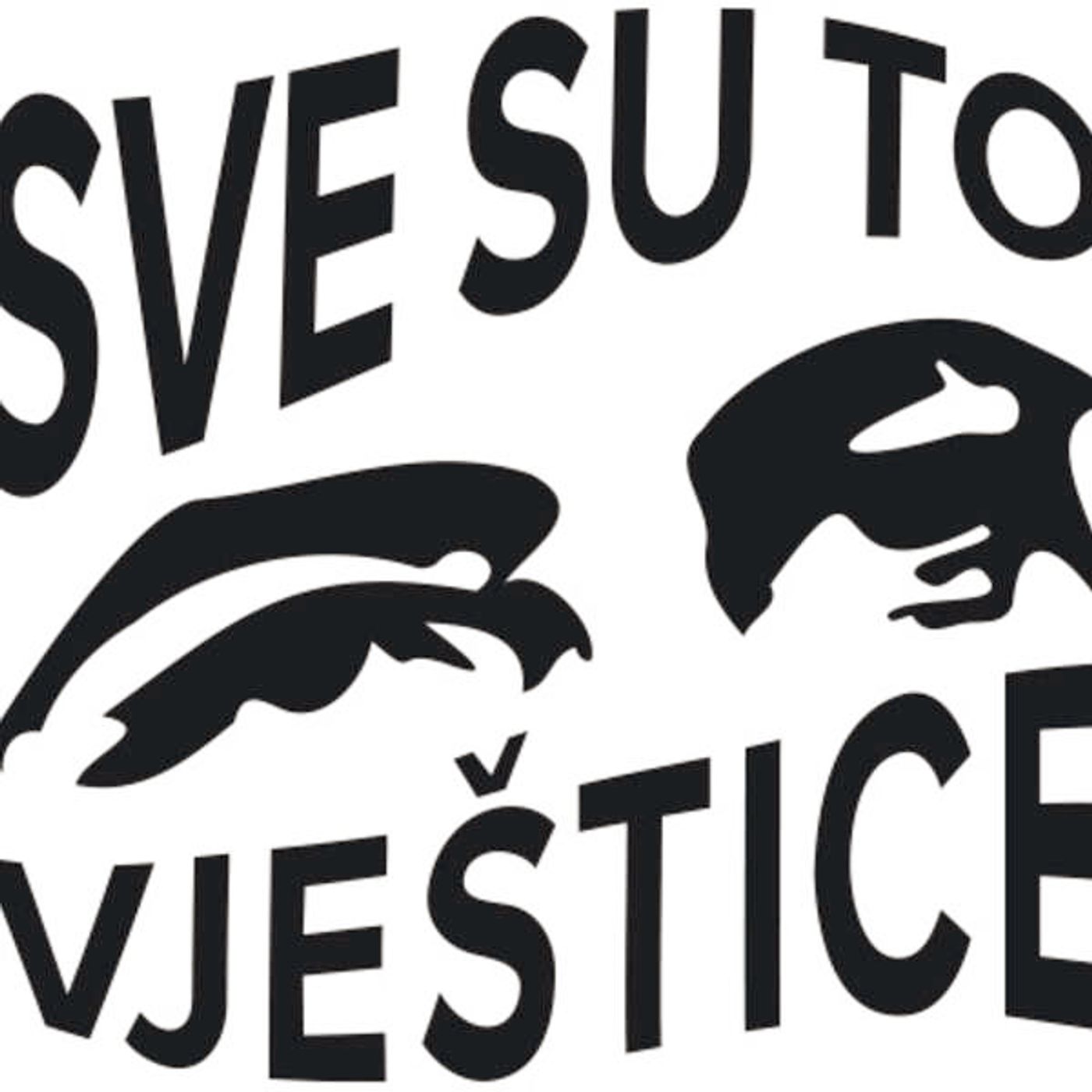Discover Pickle Bar Podcast
Pickle Bar Podcast

Pickle Bar Podcast
Author: Pickle Bar
Subscribed: 1Played: 30Subscribe
Share
© Copyright Pickle Bar
Description
A Slavic take on the apéritivo bar, Pickle Bar is a site for the exploration of loose tongues, the limits of language both as affect and discourse. Located steps away from Slavs and Tatars studio in Moabit, Pickle Bar offers different fermented items and spirits, a doubly bubbly answer to the bourgeois staples of wines and cheeses.
13 Episodes
Reverse
In this podcast an artist, Fai Ahmed, as a part of her residency-mentorship program at Slavs and Tatars, invites a music researcher Amal Mohammed to reflect on Saudi underground music. While Fai Ahmed talks about her new research, which explores the realm of the local underground music scene and its intricate ties to cultural memory and Hauntology. Together with Amal Mohammed they talk about the historical and social context of the underground recordings, delve into an era when sharing these recordings was rebellious and intolerable and share the echoes of suppressed voices and unconventional melodies that shaped culture and challenged norms in the region.The residency and the podcast is supported by Art Jameel and Goethe-Institut Saudi Arabia part of a three years collaboration with Slavs and Tatars to support young practitioners from Saudi Arabia.
In this intimate podcast, Irena Klepfisz talks about her new book, creativity and resistance, coming out, and her experience of being a lesbian Jew in New York in the 70s and 80s. Through her exclusive conversation with Ula Chowaniec, she shares personal memories and touches upon the lesbian activist and literally movements of her time, how political urgencies shaped her thinking, her relationship with Yiddish, while she recites some of her groundbreaking poems. Irena Klepfisz is a feminist, lesbian and secular Jewish poet, Yiddish translator and teacher of Jewish Women Studies. She is the author of Her Birth and Later Years, Periods of Stress, Keeper of Accounts, Different Enclosures, A Few Words in the Mother Tongue and Dreams of an Insomniac. Ula (Urszula) Chowaniec is a Research Honorary Fellow at University College London School of Slavonic and East European Studies. The podcast is part of the Lavender Languages Institute programme of the Pickle Bar. The program is supported by Bezirkskulturfonds by the department of Art and Culture of the Bezirksamts Mitte von Berlin. Audio editing by Norbert Lang
In this podcast, St. Julian-Varnon expands on her current academic work, which focuses on the study of the black diaspora in the Soviet Union and the analysis of the influence of the ideological narrative on the Soviet citizens' perceptions of Africans into children's books. Together with Dora Vasilakou, Julian Varnon spoke about the main characteristics of the Soviet children's books before and after the 1917 revolution. How writers and illustrators of children's literature portrayed people of African descent and Africa in the early Soviet era and how their imaginary narrative changed during the decades.Kimberly St. Julian-Varnon is a Ph.D. student of History and a Presidential Ph.D. fellow at the University of Pennsylvania.The podcast is part of the Azbuka Strikes Back public program in the Pickle bar. The program is supported by Haupstadtkulturfonds.
The colonial education system, led by the ambitions of the Russian Empire (among other European states) in the 19th century, as well as the “secular” pedagogy under the scope of nation-building during the USSR era in the 20th century, contributed to educational reforms imposed on territories inhabited predominantly by Muslim populations. The lecture “Child education as a strategy of decolonization: language and ethnicity in Jadid and Soviet schools” by the Kazan-based researcher, curator, and educator Artiom Slota juxtaposes these two historical educational reforms under decolonial theory. It explores the pedagogy from the position of the post-Soviet space and shares examples on historical alternatives, such as the “Jadid” schools. The podcast is part of the Azbuka Strikes Back public program in the Pickle bar. The program is supported by Haupstadtkulturfonds.
A short history of being a child during the soviet time. This podcast looks at the condition of children during the Soviet revolution in the first half of the 20th century. After the 1917 Revolution, the newly soviet system was created to educate a new generation of “comrades'' supposed to be more tolerant and respectful toward others. Research Lisa Kirschenbaum calls for a history written from the children’s perspective while sharing her analysis on the educational system produced at that time. Would this history be more inclusive in terms of gender and race? what is the influence of literature on shaping children’s ideas?Lisa Kirschenbaum is a writer and teacher based in West Chester, Pennsylvania, USA, Philadelphia. Her research focuses on modern Russia and the Soviet Union. Her books explore the themes of early Soviet childhood, war and memory, and international communism. The podcast is part of the Azbuka Strikes Back public program in the Pickle bar. The program is supported by Haupstadtkulturfonds.
On the Arabic writing system’s special features and its challenging encounters with the digital realm. The Arabic Script is essential to Islam and Muslim life. Not only is it the script of a scripture, the holy Qur’an. Itself, as a script, is considered holy and believed to carry great powers. Out of this special place in Islam superb artistic skills in calligraphy have been developed. Islamic calligraphies adorn sacred sites, book covers, or Muslim supermarkets. Sometimes these calligraphies are easily legible, often not. We may see birds and lions and only on second sight discover that lines form not only eyes, ears and paws but words. It is this seemingly hindered legibility that initially caught Alina Kokoschka's attention and made her ask: What does writing mean if it is not legible? Much more than the words to be deciphered. Much more than words can express. As a writing system, Arabic has also become part of the Linguistic Landscape of cities like Berlin. People come across writings in Arabic on shop signs, products, posters, and brochures on a daily level. But those familiar with Arabic will discover distorted characters, teared words, destroyed meaning. Again: the Arabic writing is barely legible. This time though it is not for religious reasons. Not for reasons of higher cognition. There is a problem and it is digital all along the line. With examples from East Germany to Western China Alina Kokoschka disentangle intertwined Arabic lines between typographic glitches and Islamic calligraphy, "the art of the line“.The podcast is part of the series KNOT KNOW exploring craft's potential for building solidarity and queering beliefs across Central Asia and China. The program and podcast is supported by Bezirkskulturfonds im Bezirk Mitte.Audio editing by @berlinology.
The podcast is the second in a series of events devoted to exploring Black identity in Central Asia, the Middle East and Eastern Europe by Slavs and Tatars' Pickle Bar. In "Writing Ourselves into Existence” by the Collective for Black Iranians, founding members of the Collective, Pardis Nkoy, Parisa Nkoy, Alex Eskanarkhah, Priscillia Kounkou-Hoveyda, resident artists, Pegah Bahadori as well as resident historian Beeta Baghoolizadeh, joined us to discuss the realities of erasure of Black and Afro Iranians histories within Iranian society at large and the importance of owning and writing diverse narratives about who we are. The talk will discuss how the Collective creates bilingual Farsi/English access to the histories of Black and Afro-Iranians from yesterday and today as they create culture around Black and Iranian points of view that have been overlooked. The Collective for Black Iranians was founded out of the necessity to be seen, heard and understood. A creative and critically conscious initiative, the Collective invites its audience to think beyond the imaginary cultural boundaries placed upon oneself, share, listen and celebrate the diverse Black and Afro-Iranian histories and points of view. To know more about the Collective for Black Iranians follow @collectiveforblackiranians on Instagram and check their website https://collectiveforblackiranians.org
Prof. Dr. Elmira Gyul is a doctor in art history, professor, and leading researcher at the institute of art studies at the Academy of Science of the Republic of Uzbekistan. She is the author of seven monographs and over 200 articles in art history and contemporary art in Central Asia. A special place in Elmira Gyul research is occupied by the history of textiles. She has published two monographs on this subject; Carpet of Uzbekistan: History, Aesthetics, Semantics (2019); Gardens of Heaven and Gardens of Earth. Embroidery of Uzbekistan: Hidden Meanings of the Sacred Texts (2013). Silk textile and the infamous ikat, in particular, has been the center of Gyul's recent research. The podcast discusses the specificities of the Ikat textile and the difference between ikat and abr. Focusing on the role of ikat throughout the course of history. Dr. Gyul will offer her perspective through various cultural, religious and social dimensions. Sometimes as a symbol of religious spirituality, or an everyday garment, and an indicator of the social attitude. The podcast is part of the series KNOT KNOW exploring craft's potential for building solidarity and queering beliefs across Central Asia and China. The program and podcast is supported by Bezirkskulturfonds im Bezirk Mitte.Audio editing by @berlinology.
Combining hearsays, histories and speculations, Dr. Mi You talk focus on silk both as an artefact and as cultural metaphor. Desired by the Romans, silk in the antiquity was surrounded by trickery, theft and outlandish cultural imaginations, so popular that it was preferred as a medium of exchange in Central Asia than gold coins issued by the Kushan empire. In China, silk was variously used in lieu of tax, wage and tributary payments. This then opens up a reflection on silk as a currency today, both in the cryptoworld for cross-border transactions and as a cultural currency, seen, for example, in ‘silkpunk’. Dr. You Mi is a curator, researcher and lecturer at the Academy of Media Arts Cologne. Her long-term research and curatorial projects spin between the two extremes of the ancient and futuristic. She works with the Silk Road as a figuration for deep-time, deep-space nomadic imageries and old and new networks/technologies. Under this rubric, she has curated programs at Asian Culture Center in Gwangju, South Korea, Ulaanbaatar International Media Art Festival, Mongolia (2016), and with Binna Choi, she is co-steering a research/curatorial project “Unmapping Eurasia” (2018-2021). At the same time, her interests in politics around technology and futures led her to work on “actionable speculations”, articulated in the exhibition, workshops and sci-fi-a-thon “Sci-(no)-Fi” at the Academy of the Arts of the World, Cologne (2019), as well as in her function as chair of committee on Media Arts and Technology for the transnational political NGO Common Action Forum. She is one of the curators of the 13thShanghai Biennale (2020-2021).Her academic interests are in media theory and performance philosophy, science and technology studies, as well as new and historical materialism. She is fellow of Alexander von Humboldt Foundation (Germany), member of the Academy of Arts of the World(Cologne), and serves as director of Arthub (Shanghai) and advisor to Institute for Provocation(Beijing). The podcast is part of the series KNOT KNOW exploring craft's potential for building solidarity and queering beliefs across Central Asia and China. The program and podcast is supported by Bezirkskulturfonds im Bezirk Mitte.Audio editing by @berlinology.
About being a punk rocker in Bosnia and Herzegovina and suddenly a refugee in Germany. As well as everything before, around and after that. With Tijan Sila, a rising star of German literature, whose third novel "Krach" has been trending all throughout the year 2021. Moderated by Hana Ćurak (Sve su to vještice), a former Pickle Bar resident.This podcast is produced in connection with Slavs and Tatars' project Aşbildung incooperation with the Kunsthalle Osnabrück, supported by the Sievert Foundationfor Science and Culture and the Friends of the Kunsthalle Osnabrück.
„Wo kommst du her?“ - „Nein wirklich, wo kommst du ursprünglich her?“ - „Wo kommen deine Eltern her?“[Antwort]„Ohhh exotisch!!“ - „Kenn ich nicht…“ - „Ah, dachte du wärst aus [anderes Land mit größtenteils dunkelhaariger Bevölkerung]!“Jeder*jedem sollten diese Konversationen bekannt vorkommen - ob als diejenige Person, die die Fragen stellt oder diejenige, die sie ständig beantworten muss. Oder beides. Migrant*innen werden tagtäglich mit Situationen konfrontiert, in denen andere oder auch sie selbst ihre [kulturelle] Identität hinterfragen. Die Schwestern Ana und Mari Mekineli, deren Eltern aus Georgien stammen, nehmen die Zuhörer*innen in einem Gespräch, was sie schon oft geführt haben, in ihre Vergangenheit mit und befassen sich mit dem Thema Identität[skrise].Dieser Podcast entsteht in Verbindung zu Slavs und Tatars Projekt Aşbildung in Kooperation mit der Kunsthalle Osnabrück, gefördert durch die Sievert Stiftung für Wissenschaft und Kultur und die Freunde der Kunsthalle. Aşbildung erweitert das Osnabrücker Döner Restaurant Toros um einen kontemplativen Moment und unterstreicht die Wichtigkeit, die Verdauung von geistiger und körperlicher Nahrung als Einheit zu betrachten.This podcast is produced in connection with Slavs and Tatars' project Aşbildung incooperation with the Kunsthalle Osnabrück, supported by the Sievert Foundationfor Science and Culture and the Friends of the Kunsthalle Osnabrück.
Drawing on the daoist philosophy of xing (性) (nature/sexuality), hexie (和谐) (harmony) and tianren heyi (天人合) (the unity between the human world and the non-human world), the lecture Metamorphosis of A Butterfly: Queer Art and Activism in Contemporary China by Dr. Hongwei Bao looks at queer art beyond Western queer theory, modern gay identity, from indigenous and ancient perspectives and addressing questions of sexuality, urban migration and LGBT communities in recent years in China.Dr Hongwei Bao is Associate Professor in Media Studies at the University of Nottingham, UK, where he also directs the Centre for Contemporary East Asian Cultural Studies. He is also a research associate of the Birmingham School of Art. Dr Bao is the author of three books on Chinese queer culture: Queer Comrades, Queer China and Queer Media in China. He is a Fellow of the Royal Society of the Arts and the Higher Education Academy in the UK.The podcast is part of the series KNOT KNOW exploring craft's potential for building solidarity and queering beliefs across Central Asia and China. The program and podcast is supported by Bezirkskulturfonds im Bezirk Mitte.Audio editing by @berlinology.
The first episode of Pickle Bar Podcast introduces Zavier Wingham’s lecture “A Brief History of the African Diaspora in the Ottoman Empire and Modern Turkey”. The podcast is the first in a series exploring various articulations of Black identity in Central Asia, Caucasus and Eastern Europe as an attempt to complicate the Atlanticist notion of race most of us are familiar with.The lecture was held on 5th March 2021 in the framework of the extended program for the exhibition “1 Million Roses for Angela Davis” at the Albertinum (Staatliche Kunstsammlungen Dresden) with the kind support of Goethe-Institut New York.Zavier Wingham is a PhD candidate in the joint program for History and Middle East and Islamic Studies at New York University and currently a PhD fellow at Koç University’s Research Center for Anatolian Civilizations. He is also an editor at Ajam Media Collective.Audio production by Audiokombinat, Berlin.












